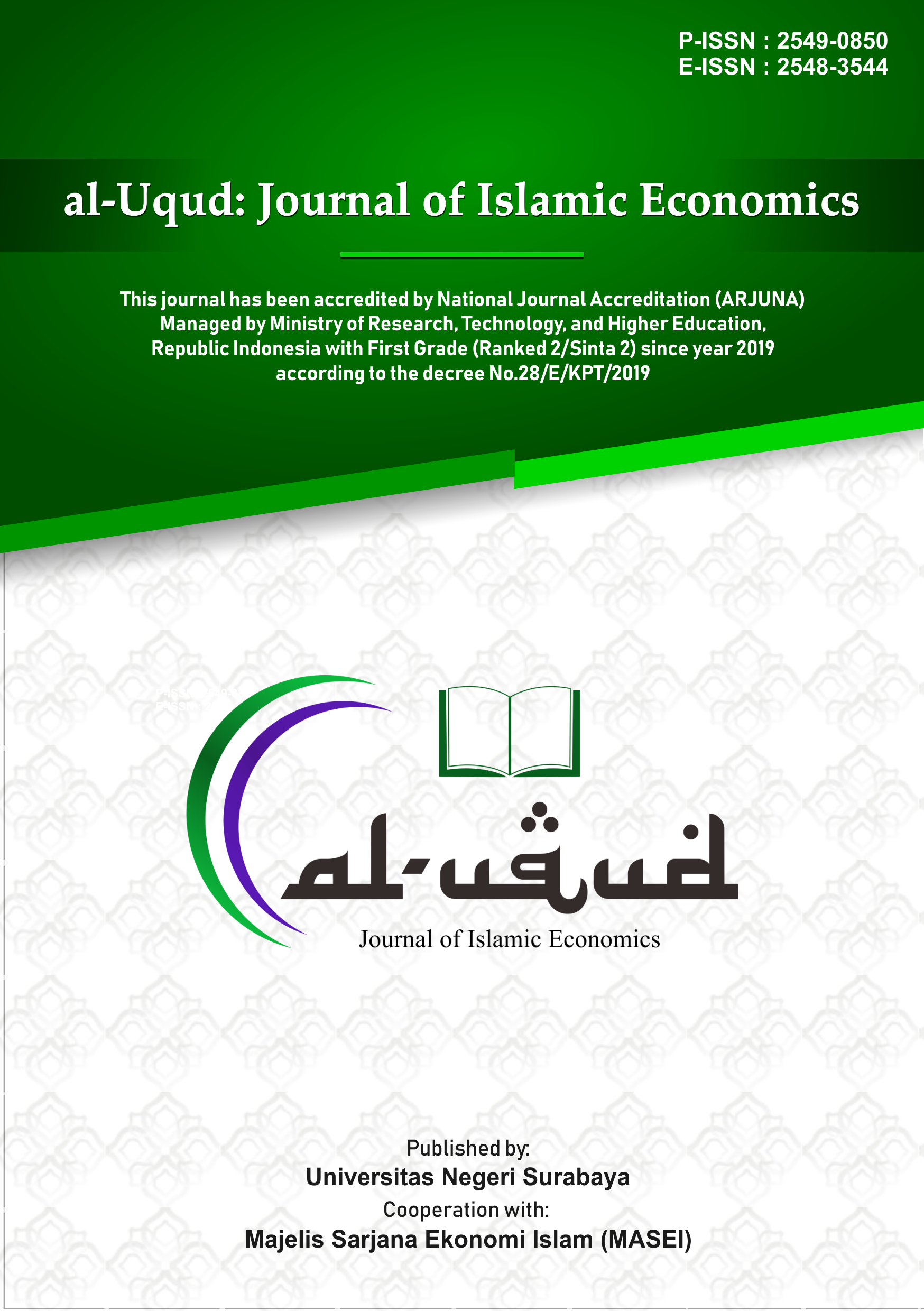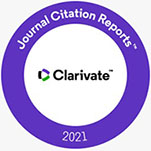Do Individual Factors, Religiosity Factors, and Demographic Factors Predict Intention to Pay Zakat?
DOI:
https://doi.org/10.26740/al-uqud.v5n1.p151-165Keywords:
Intention to Pay Zakat, Individual, Religiosity, Demographic.Abstract
Indonesia has a promising zakat potential; however, the amount of zakat payments is low. The primary objective of this study is to examine what factors influence an individuals intention to pay zakat. This research integrates individual factors, religiosity factors, and demographics factors. About 300 questionnaires were distributed to the respondents in a Muslim-majority area (i.e. Surakarta City), and 223 cases were deemed usable. The data have been analysed using structural equation modelling. This paper finds that attitude, subjective norm, and perceived behaviour control positively affect the intention to pay zakat. Furthermore, religiosity factors and demographic factors also positively affect the intention to pay zakat except for the Islamic education background variable. Theoretically, this study offers a new research model to explain the behaviour of Muzakki in paying zakat. Practically, this study contributes to providing valuable insights for zakat institutions to establish a policy to collect zakat based on individual perspectives.References
Abdullah, M., & Sapiei, N. S. (2018). Do religiosity, gender and educational background influence zakat compliance¯? The case of Malaysia. https://doi.org/10.1108/IJSE-03-2017-0091
Ahmed, H. and M. S. A. M. H. A. P. (2016). Inclusive Islamic financial planning¯: a conceptual framework. International Journal of Islamic and Middle Eastern Finance and Management, 9(2), 170189. https://doi.org/10.1108/IMEFM-01-2015-0006
Al Jaffri, S. & Haniffa, R. (2014). Determinants of zakah ( Islamic tax ) compliance behaviour. Journal of Islamic Accounting and Business Research, 5(2), 182193. https://doi.org/10.1108/JIABR-10-2012-0068
Ajzen, I. (1991). The Theory of Planned Behaviour. Organisational, Behaviour, and Human Decision Processes, 211, 179211.
Ajzen, Icek, & Fishbein, M. (1969). The Prediction of Behavioural Situation. Journal of Experimental Social Psychology, 5(1967), 400416.
Alleyne, P., Soleyn, S., & Harris, T. (2015). Predicting Accounting Students Intentions to Engage in Software and Music Piracy. Journal of Academic Ethics, 13(4), 291309. https://doi.org/10.1007/s10805-015-9241-7
Andam, A.C., & Osman, A. Z. (2019). Determinants of intention to give zakat on employment income. 10(4), 528545. https://doi.org/10.1108/JIABR-08-2016-0097
Aziz, M.N & Mohamad, O. B. (2016). Islamic social business to alleviate poverty and social inequality. International Journal of Social Economics, 43(6), 573592. https://doi.org/10.1108/IJSE-06-2014-0129
Bloodgood, J. M., Turnley, W. H., & Mudrack, P. (2008). The Influence of Ethics Instruction, Religiosity, and Intelligence on Cheating Behaviour. Journal of Business Ethics, 82(3), 557571. https://doi.org/10.1007/s10551-007-9576-0
Canggih, C., Fikriyah, K., & Yasin, A. (2017). Inklusi pembayaran zakat di indonesia. Jurnal Ekonomi Dan Bisnis Islam, 3(1), 111.
Chourou, L. (2018). Does Religiosity Matter to Value Relevance¯? Evidence from U . S. Banking Firms. Journal of Business Ethics, 162(3), 675697. https://doi.org/10.1007/s10551-018-3978-z
Cronan, T. P., J. K. M. and D. E. D. (2015). Further Understanding Factors that Explain Freshman Business Students Academic Integrity Intention and Behaviour¯: Plagiarism and Sharing Homework. Journal of Business Ethics, 147(3), 124. https://doi.org/10.1007/s10551-015-2988-3
DAttoma, J., Volintiru, C., & Steinmo, S. (2017). Willing to share¯? Tax compliance and gender in Europe and America. Research and Politics, 4(2), 110. https://doi.org/10.1177/2053168017707151
Darr, W. (2005). The Influence Of Religiosity And Work Status On Psychological Contracts. The International Journal of Organizational Analysis, 13(1), 89102.
Farah Mastura, N.A. and Zainol, B. (2015). Factors Influencing Zakat Compliance Behaviour on Saving Factors. International Journal of Business and Social Research, 5(1), 118128. https://doi.org/10.18533/ijbsr.v5i1.688
Hairunnizam, W., Sanep, A. and Mohd Ali, M. N. (2007). Kesedaran Membayar Zakat Pendapatan di Malaysia. Islamiyyat, 29, 5370.
Haji-othman, Y. (2017). The Influence of Attitude , Subjective Norm , and Islamic Religiosity on Compliance Behaviour of Income Zakat Among Educators. November. https://doi.org/10.6007/IJARBSS/v7-i11/3549
Haji-Othman, Y., Alwi, I., Sheh Yusuff, M. S., & Mohd Saufi, M. S. A. (2017). The Influence of Attitude, Subjective Norm, and Islamic Religiosity on Compliance Behaviour of Income Zakat Among Educators. International Journal of Academic Research in Business and Social Sciences, 7(11), 11101116.
Heikal, M, Khaddafi, M., F. (2014). The Intention to Pay Zakat Commercial¯: An Application of Revised Theory of Planned Behaviour. 6(9), 727734.
Heikal, M. and Khaddafi, M. (2014). The Intention to Pay Zakat Commercial¯: An Application of Revised Theory of Planned Behaviour. Journal of Economics and Behavioural Studies, 6(9), 727734.
Huda, Nurul; Rini, Nova; Mardoni, Y. (2012). The Analysis of Attitudes , Subjective Norms , and Behavioural Control on Muzakki s Intention to Pay Zakah. 3(22), 271279.
Idris, K. M., Bidin, Z., & Saad, R. A. J. (2012). Islamic religiosity measurement and its relationship with business income zakat compliance behaviour. Jurnal Pengurusan (UKM Journal of Management), 34.
Johnson, B. R., Jang, S. J., Larson, D. B., & Li, D. E. (2001). Does Adolescent Religious Commitment Matter? A Reexamination of the Effects of Religiosity on Delinquency. Journal of Research in Crime and Delinquency, 38(1), 2244. https://doi.org/10.1177/0022427801038001002
Kamil, M.I., Zainol, B. and Jaffri, R. A. (2012). Islamic Religiosity Measurement and Its Relationship with Business Income Zakat Compliance Behaviour. 34, 310.
Liao, L., Luo, L., & Tang, Q. (2014). Gender diversity , board independence , environmental committee and greenhouse gas disclosure q. The British Accounting Review, 116. https://doi.org/10.1016/j.bar.2014.01.002
Martono, S., Nurkhin, A., Lutfhiyah, F., & Rofiq, A. (2019). The Relationship Between Knowledge , Trust , Intention to Pay Zakah , and Zakah-Paying Behaviour. 10(2), 7581. https://doi.org/10.5430/ijfr.v10n2p75
Mayhew, M. J., Hubbard, S. M., Finelli, C. J., & Harding, T. S. (2009). Using Structural Equation Modeling to Validate the Theory of Planned Behaviour as a Model for Predicting Student Cheating Using Structural Equation Modeling to Validate the Theory of Planned Behaviour as a Model for Predicting Student Cheating. 32(4), 441468. https://doi.org/10.1353/rhe.0.0080
Mohdali, R., & Pope, J. (2014). The influence of religiosity on taxpayers compliance attitudes Empirical evidence from a mixed-methods. 27(1), 7191. https://doi.org/10.1108/ARJ-08-2013-0061
Nanji, A. A. (1985). Ethics and Taxation: The Perspective of the Islamic Tradition. Journal of Religious Ethics, 13(1), 161178.
Nor, M.A.M., Wahid, H. and Nor, N. G. M. (2004). Kesedaran membayar zakat pendapatan dikalangan kakitangan professional Universiti Kebangsaan Malaysia. Islamiyyat, 26(2), 5967.
Palil, M. R., Fadillah, W., & Wan, B. (2013). The Perception of Tax Payers on Tax Knowledge and Tax Education with Level of Tax Compliance¯: A Study the Influences of Religiosity. 1(1), 118129.
Samad, A., & Glenn, L. M. (2010). Development of Zakah and Zakah coverage in monotheistic faiths. International Journal of Social Economics, 37(4), 302315. https://doi.org/10.1108/03068291011025264
Schouten, C. M. D. D. (2013). Religiosity , CSR Attitudes , and CSR Behaviour¯: An Empirical Study of Executives Religiosity and CSR. 123, 437459. https://doi.org/10.1007/s10551-013-1847-3
Tiliouine, H., & Belgoumidi, A. (2009). An exploratory study of religiosity, meaning in life and subjective wellbeing in muslim students from Algeria. Applied Research in Quality of Life, 4(1), 109127. https://doi.org/10.1007/s11482-009-9076-8
Torgler, B. (2006). The importance of faith¯: Tax morale and religiosity. 61(1), 81109. https://doi.org/10.1016/j.jebo.2004.10.007
Wan Ahmad, W.M, W., Rahman, A. A., Seman, A. C., & Ali, N. A. (2008). Religiosity And Banking Selection Criteria Among Malays In Lembah Klang. Jurnal Syariah, 16(2), 99130.
Watson, J., & Mcnaughton, M. (2007). Gender Differences in Risk Aversion and Expected Retirement Benefits. 63(4), 5262.
Downloads
Published
How to Cite
Issue
Section
License
CC BY 4.0 Abstract views: 1023
,
Abstract views: 1023
, PDF Downloads: 1085
PDF Downloads: 1085








